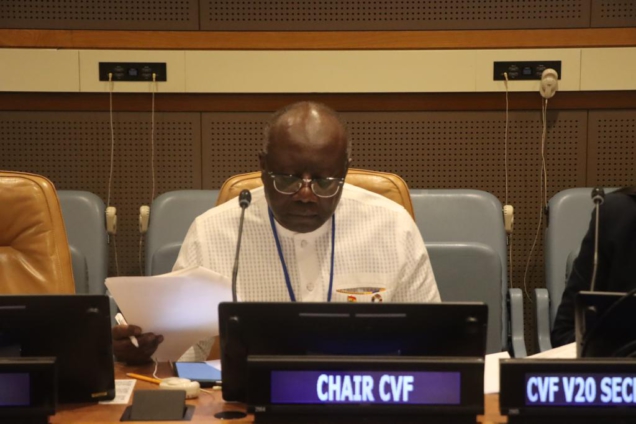The government has assured Ghanaians that it will safeguard current economic gains, and make it reflect in the living conditions of everyone in the coming months.
To this end, there would be more expenditure reduction measures in the 2024 budget, as well as policies to consolidate macroeconomic gains, ensuring that inflation and exchange rates are tamed.
Mr Ken Ofori-Atta, Finance Minister and Mr Kojo Oppong Nkrumah, Information Minister, gave the assurances on Friday evening ahead of the budget presentation in November.
They spoke on the sidelines of the 2023 International Monetary Fund (IMF)/World Bank Group (WBG) Annual Meetings in Marrakech.
“You’ll see more prudent fiscal measures in the 2024 budget to keep the macroeconomy stable so that inflation continues to go down and the currency remains stable.
“That’s an assurance from the government that will surely happen” Mr Ofori-Atta said. “We’ll also find various incentives and resources into the growth agenda that we have to catalyse the private sector to thrive,” the Minister pledged during a press briefing.
The government introduced a number of cost-cutting measures in the 2023 budget, including, a freeze on employment in the public sector, a reduction in salaries of some government officials, aimed at supporting macroeconomic stability.
In an interview with the Ghana News Agency, Mr Nkrumah said those measures had started yielding positive results, but the government would do more, which would be specified in the 2024 budget.
“Although we don’t have the final figures, one of the clearest ways to examine the performance of the measures to reduce expenditure is to look at the primary balance, and there’s a clear indication that we’re doing well to stay within the revenue envelope that we have,” he said.
Ghana’s primary balance – the difference between the amount of revenue the government collects and spends on providing public goods and services, excluding debt payment, was −1.3 as of the first half of 2022, but stood at 0.6 the same period, 2023.
Reiterating the government’s commitment to fiscal discipline, Mr Nkrumah said: “Going forward, our focus is to stay on that path to ensure that we don’t blow the fiscals out of gear.”
Some Civil Society Groups, Economists and Governance experts in the country have been calling for a reduction in the number of ministers and government officials as part of measures to maintain fiscal discipline, but that is yet to happen.
They have also encouraged the government to be more aggressive in collecting property taxes, incentivise to rope the informal sector into the tax net and reduce the rate of the Electronic Transactions Levy (E-levy) to about 0.5 per cent from one per cent.
They expressed confidence in increasing domestic revenue to support expenditure reduction measures, making the economy more robust.
Latest Stories
-
524 Diasporan Africans granted Ghanaian citizenship in ceremony
1 min -
Mahama urges Afram Plains North residents to avoid ‘skirt and blouse’ voting
3 mins -
Asantehene receives more 19th century gold ornament and regalia
10 mins -
Hohoe Ghana Blind Union organises training for members ahead of Election 2024
17 mins -
Alan Kyerematen reveals his future plans for Ghanaian Health professionals
18 mins -
AAIN empowers women and small enterprises in Upper East Region through SHINE project
19 mins -
Akufo-Addo leads nationwide commissioning of 80 educational projects
25 mins -
Ghana and Seychelles strengthen bilateral ties with focus on key sectors
56 mins -
National Elections Security Taskforce meets political party heads ahead of December elections
59 mins -
Samsung’s AI-powered innovations honored by Consumer Technology Association
1 hour -
Fugitive Zambian MP arrested in Zimbabwe – minister
2 hours -
Town council in Canada at standstill over refusal to take King’s oath
2 hours -
Trump picks Pam Bondi as attorney general after Matt Gaetz withdraws
2 hours -
Providing quality seeds to farmers is first step towards achieving food security in Ghana
2 hours -
Thousands of PayPal customers report brief outage
2 hours

